Mainstream dating apps — think the likes of Tinder, OkCupid and even Grindr — have earned themselves a fairly bad rap over the years. They’ve been derided as shallow and unfulfilling, for placing an undue emphasis on physical looks and little else; some studies have even decried these apps for causing psychological distress, anxiety, and low self-esteem in its users — to say nothing of users with illnesses both physical and mental.
And yet in a world that’s increasingly connected and online, it’s safe to say that dating apps are here to stay. But what if these apps focused more on honesty and openness — instead of touched-up holiday selfies and saccharine dog photos?
Enter Lovenn, a new app invented by a Singaporean who — after “swiping through 200,000 profiles” and going on 50 fruitless first dates — found herself dissatisfied with the current state of modern dating. And despite being founded only in June, Lovenn has already attracted a waitlist of 1,000 very eager singles.
“Traditional dating apps make us focus on superficiality instead of what’s really important,” says founder Vernice Yap. “People feel obliged to paint an Instagram-ready picture of themselves to conform to social norms — which is why many singles don’t share their ‘imperfections’ until the first date, or even after many dates.
“And users who have visible or invisible illnesses face rejections by their matches upon revealing them — in my case, my dates asked to remain just as friends after I told them I have depression.”
That’s where Lovenn differs from traditional dating apps: in its emphasis on dealbreakers — more specifically, how it wants its users to be upfront about these dealbreakers.
After filling out mundane details like gender preferences and social circumstances, singles must then list down their personal dealbreakers. These can be undesirable traits they’d rather not have in a partner, or honest admissions about their own circumstances.
A divorced single parent can frankly state their situation here, as can a person struggling with heavy depression and anxiety. These fields are plain and open for all to see — thus reducing the likelihood of awkward conversations or confessionals some 10 dates down the line.
Conventional dating wisdom posits that the less-flattering aspects of oneself be saved for later. But Yap disagrees. She says: “Some might say it’s better to know the other person first — but let’s be honest. Do you really not have any dealbreakers? Isn’t it better to lay it all out at the very start, and save each other’s time?”
As Yap explains, every aspect of Lovenn has been designed with its users in mind — and less about monetisation or about keeping them hooked on a cycle of swipes and matches.
How it does so is by replacing the matching algorithm commonly used by other dating apps, which shows singles potential paramours ranked by their ‘popularity’ rather than compatibility. Instead, Lovenn shows its users what exactly the other person likes about their profile — along with a prosaic percentage score of how compatible they are.
“The profile you see right now is better for you than the next one,” says Yap. “This helps alleviate that FOMO feeling (fear of missing out), so you won’t always feel like ‘the next profile could be better’ and keep on swiping.”
Users can also see who already ‘liked’ their profiles, which removes the guessing-game element on traditional dating apps.
“We don’t expect our users to marry the first profile they see,” laughs Yap. “But instead of feeling the need to swipe through 200,000 profiles to find your best match, you could go through maybe 200, or even just 20 profiles.”
Beyond its lengthy waitlist, Lovenn has also attracted some notable admirers: the app is supported by Enterprise Singapore, startup incubator Pollinate, as well as the Alibaba Cloud – SUSS Entrepreneurship Programme.
Yap believes strongly in the app, having walked away from a “financially rewarding” job at an investment bank in Hong Kong to start Lovenn — and in doing so, defying naysayers who told her that the dating market was far too saturated to accommodate yet another app.
“There might be many dating apps in the market, but the statistics on singlehood have been rising every year,” she quips.
Yap says that she doesn’t just want to help more lonely hearts find their match — she has aspirations to change how society approaches dating as a whole.
Says Yap: “In the long term, I hope Lovenn will revolutionise the dating scene globally by creating a new dating culture — one that makes having honest conversations, and making meaningful connections, the norm.”


